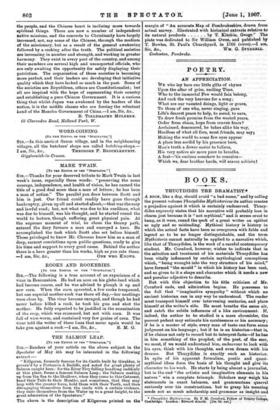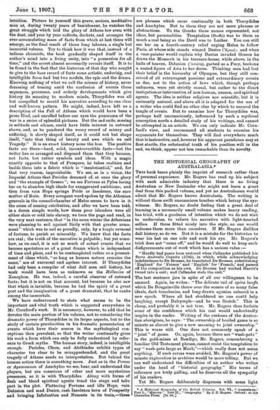13 0 0 It S:
THUOYDIDES THE DRAMATIST,
A BOOE, like a dog, should avoid "a bad name," and by calling the present volume Thueydides ifythistoricus its author creates a prejudice against it which is certainly undeserved. Thuey- aides expressly states that his narrative will probably lose in charm just because it is "not mythical," and it seems cruel to hang, as it were, round the neck of a great writer an epithet so ugly and so misleading! Mythical history is history in which the actual facts have been so overgrown with fable and legend as to be no longer distinguishable, and the term Mythisioria cannot naturally be applied to a narrative which, like that of Timeydides, is the work of a careful contemporary student. Mr. Cornford, however, wishes to indicate that in the selection and treatment of his materials Thucydides has been vitally influenced by certain mythological conceptions which, "being wrought into the very structure of his mind," have formed "the mould" in which his history has been cast, and so given to it a shape and character which it needs a new and peculiar adjective to describe.
But with this objection to his title criticism of Ms. Cornford ends, and admiration begins. He possesses to the full that "imaginative sympathy" without which no ancient historian can in any way be understood. The reader must transport himself over intervening centuries, and place himself at the writer's side. He must breathe the same air, and catch the subtle influences of a like environment. If, indeed, the author to be studied is a mere chronicler, the poorest pedant may estimate his carelessness or his accuracy ; if he is a master of style, every man of taste can form some judgment on his language ; but if he is an historian—that is, if he claims not only to record but to interpret facts—if he has in him something of the prophet, of the poet, of the seer, we must, if we would understand Lim, endeavour to look with his eyes, think with his thoughts, and even dream with his dreams. But Thucyclides is exactly such an historian. In spite of his apparent formalism, poetic and quasi- mythical ideas form the basis of his thought and give its character to his work. He starts by being almost a journalist, but in the end "the artistic and imaginative elements in his nature" win a complete triumph. Scholars spay weigh hie statements in exaot balapeee, and grammarians quarrel curiously over his constructions, but to grasp his meaning needs not so neigh scholarship and grammar as insight and • Thucycliden Ilfothistorious. By F. IL Comfort), Fellow of Trinity College, Cambridge. London Ediard Arnold. [Ida dd. not.] intuition. Picture to yourself this grave, serious, meditative man as, during twenty years of banishment, he watches the great etruggle which laid the glory of Athens low even with the dust, and year by year collects, dockets, and arranges the ever-accumulating mass of facts from which at last there will emerge, as the final result of those long labours, a single but immortal volnme. Try to think how it was that, instead of a tedious chronicle, the book gradually shaped itself in the author's mind into a living unity, into "a possession for all time," and the secret almost necessarily reveals itself. It is to be found in the fact that the historian of that day who sought to give to the bare record of facts some artistic, enduridg, and intelligible form had hut two models, the epic and the drama. Knowing nothing of what we call the science of history, never dreaming of tracing amid the confusion of events those sequences, processes, and orderly developments which give history its meaning to modern minds, Thucydides was all but compelled to mould his narrative according to one clear and well-known pattern. He might, indeed, have left us a description of the Fall of Athens which would have been a prose Iliad, and unrolled before our eyes the panorama of the war in a series of splendid pictures. But the sad exile, musing in solitude and silence, could have little interest in outward shows, and as he pondered the weary record of misery and suffering, it slowly shaped itself, as it could not but shape itself, " intO that thing of beauty and awe which we call Tragedy." It is an exact history none the less. The positive facts are there—hard, solid, incontrovertible facts—but the writer has so arranged and disposed them that they become, not facts, but rather symbols and ideas. With a veggie exactly opposite to that of Prospero, he takes realities and builds them into a fabrics which is "insubstantial," and, for that very reason, imperishable. We see, as in Y, vision, the Imperial Athena that Pericles dreamed of, at once the glory and "the example of Greece"; we see Fortune at Pylos luring her on to abandon high ideals for exaggerated ambitions; and then from vain Hope springs Pride or Insolence, the sure mother of Ruin, Every arrogant word spoken by the Athenian generals in the council•chamber of Moles seems to have in it the omen of coming retribution, and after we have been told, in a dozen simple words, how these poor islanders were all either slain or sold into slavery, we turn the page and read, in the very next sentence, that "in the same winter the Athenians were planning to sail against Sicily with that greater arma. ment" which was to sail so proudly, only, by a tragic reversal of fortune, to perish so miserably. We know that the facts are real ; the truth of the narrative is palpable ; but yet some- how, as we read, it is not so much of actnal events that we become spectators as of a great drama which is independent of time and place, and to be contemplated rather as a present- ment of ideas which, "so long as human nature remains the same," are of univeraal and ageless interest. If Thucydides bad only been a compiler of what dull men call history, his work would have been as unknown as the ifellegica of Xenophon. He was, indeed, a careful observer of outward facts; but it is not on that account, but because he also saw that which is invisible, because he had the spirit of a great poet and the imagination of a great dramatist, that he ranks among, the immortals.
We have endeavoured to state what seems to be the important and vital truth which is suggested everywhere in Mr. Oornford's work. It is necessary, however, to add that he devotee the main portion of his volume, not to considering the dramatic power of Thucydides in its larger aspects, but to the stody of certain peculiarities in his dramatic presentation of events which have their source in the mythological con- ceptions then prevalent, so that the writer continually gives his work a form which Can only be fully understood by refer- ence to Greek myths. The human story, indeed, is intelligible enough. Pericles, Oleon, and Alcibiades exhibit types of character too clear to be misapprehended, and the great tragedy of Athens needs no interpretation. But behind the human action there is something more. Just as in the Persae or Agamemnon of Aeschylus we see, hear, and understand the players, but are conscious of other and more mysterious presences, so it is with Thucydides. Along with forms of flesh and blood spiritual agents tread the stage and take part in the plot. Flattering Fortune and idle Hope, vain Heimann and mad Desire, rash Insolence born of Prosperity and bringing Infatuation and Nemesis in its train,—these
are phrases which recur continually in both Thucydides and Aeschylus. But te them they are not mere phrases or abstractions. To the Greeks these names represented, not ideas, but personalities. Temptation (11.0a) was to them as much a real being as the Devil was to Luther. You can still see her on pe fourth-century relief urging Helen to follow Paris, at whose side stands winged Desire ("Epos); and when a vase-painter would explain why Darius invaded Greece he draws the Monarch in his treasure-house, while above, in the balls of heaven, Delusion ('Aadra), garbed as a Fury, beckone a seated figure of Asia to her doom. Thinking men had lost their belief in the hierarchy of Olympus, but they still con- ceived of all extravagant passions and extraordinary event! as due, not to the action of laws which, though perhaps unknown, were yet strictly causal, but rather to the direct instigation or intervention of non-human, unseen, and spiritual agents. The idea is neither religious nor scientific, but it is eminently natural, and above all it is adapted for the use of it writer who could find no other clue by which to unravel the tangle of events. But to examine how far Thucydides was, perhaps half unconsciously, influenced by such a mythical conception needs a detailed study of his writings, and cannot he attempted in an article. We can only indicate Mr. Corn. ford's view, and recommend all students to examine his arguments for themselves. They will find everywhere much that is instructive, and, however his apparent paradoxes may at first startle, the substantial truth of his position will in the end, we think, appear not less remarkable than its novelty.







































 Previous page
Previous page